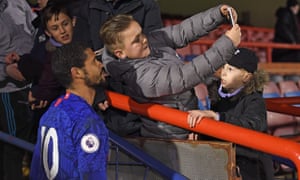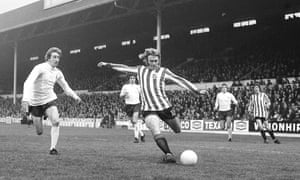English football should prepare for a new financial reality after coronavirus | Football
The decision of Barnet chairman Tony Kleanthous to lay off all non-playing staff at the club may look drastic, but he is unlikely to be the last owner to voluntarily lower his club’s status. English football is going to have to press the reset button in light of the coronavirus pandemic. The same concerns are everywhere.
Even where TV money is the major income, revenue is going to collapse. Almost every club in the country pays players more than it should, in most cases, more than the club can really afford. Players will have to take a reality check and reduced pay cheques. The £5,000-a-week League One star has to accept his next contract could be half that, unless he can secure a move to the Championship. Instead of being offered £40,000 a year, players in League Two may have to take the national layman’s £25,000. The non-league player on £200 a game may be offered £100 next season. And so it goes.
Last Friday morning, when the EFL announced they were suspending all football, I was pulling up at Stevenage FC’s academy base. Some youth team players yelped with joy at the prospect of a weekend off. But, with Stevenage bottom of League Two and already treading a financial tightrope, staff at the club realised how serious it was. Some immediately feared for their future, with contracts running out.
At Stevenage and throughout the country, there are teenagers in the final months of their apprenticeship contracts who may never play another game for their club, among hundreds of young players whose professional football careers are over. Just like that. They just don’t know it yet.
With the EFL called off, I ventured to Essex the following afternoon to watch the last throes of the National League: a relegation six-pointer between Braintree Town and St Albans City in National League South, the fifth tier. St Albans were streets ahead of the hosts from start to finish and should have won far more comfortably than the 1-0 scoreline, courtesy of an own goal.
Braintree, who have one of the smallest budgets in the division and their team did not look sturdy enough to survive on Saturday. They had several teenage loan signings, and a handful of young players experiencing their first full season in men’s football. Among Braintree’s five past or present Stevenage academy lads was Zak Guerfi, plugging away in their overrun midfield. Two summers ago, the 21-year-old was deemed not good enough for League Two and he has had a series of extraordinary experiences since then.
Having earned a two-year contract with Swedish club Boden IK, Guerfi won promotion there, got picked for Tunisia Under-21s, was then called up to the national team training camp and secured a big transfer to Tunisian top-flight club Monastir. That was the up curve.
The down has been dramatic: after being injured in pre-season and then not paid for six months, Guerfi took Monastir to court and fought Fifa before finally being set free. He eventually signed for Braintree last month. Now, after playing his first three games since last summer, the coronavirus has brought his career to another shuddering halt.
“I haven’t had a paycheck from football since last June,” said the effervescent Guerfi. “I didn’t get one payment from Tunisia in six months. I’m still owed a five-figure sum by Monastir. I had a €200,000 buyout clause when I only wanted to sign for Wealdstone! Then they didn’t sign my international clearance which stopped me playing for Hungerford.
“I’ve been training every morning with a coach and living off my signing-on bonus from Tunisia, which luckily I banked. But like most Braintree players I’m non-contract so, if we don’t play, we won’t get paid. A lot of players are going to be jobless. Some live with their mums and dads, but most rely on their football money to pay the bills. A lot of the lads do coaching jobs in schools but, with schools closed, that is going to stop too. The captain has got a new baby – how is he going to cope? Where is the next cheque coming from?”
Guerfi is living with his mum, not knowing when or where he will get the chance to get his football career back on track. “It might sound wrong but I don’t want to get a normal job yet. Thinking that six months ago I was in a dressing room with Champions League players, on the bench across from Perisic and Modric [Guerfi was with Tunisia when they beat Croatia in June 2019], and now I might have to go on a building site, that kills you. But it’s life.”
Fantasy football
Some British footballers are still playing. Due to most clubs attracting crowds of considerably less than 500, clubs in Sweden’s second and third tiers are continuing to prepare for the new season, scheduled to start on 6 April. Prolific former Rotherham United striker Adam Johnson and teenage ex-Blackpool goalkeeper Harvey Simson played this week for Boden behind closed doors up near the arctic circle.
Dylan Switters and Aran Ekumah – released last summer by Stevenage and Norwich, respectively – have had a couple of pre-season games for Gottne in Örnsköldsvik on the Gulf of Bothnia. And, a few hours south-west, Luke Hirst (once of Dagenham), Kain McGaughey (Wigan) and Raeece Ellington (Bradford City) are a fortnight into three-month deals at fifth-tier Mora IK. Defender Jordan Boon, 19, who played three times for Bolton’s first team earlier this season, arrived at Östersunds last Wednesday, got injured in his first training session and has returned home already.
Next man up: Luke Robinson
Yet again Category 1 academy giants Chelsea, Manchester United and Manchester City have reached the FA Youth Cup semi-finals, but that does not tell half the story. There were nine EFL clubs in the last-16. In the quarter-finals, Millwall – roared on by 1,000 fans – only went down 1-0 at Stamford Bridge, City scraped past another Category 2 academy in Burnley 1-0, and Blackburn thrashed a bewildered Arsenal 4-1 at Ewood Park.
In the other tie, Category 2 newcomers Wigan did themselves proud in a 2-1 defeat at Old Trafford. Among the young Wigan heroes was left-back Luke Robinson, who has been rewarded with a two-and-a-half-year professional deal. “Luke has a huge amount of talent – with ambition to match – and if he maintains these qualities he has a very good chance of a successful career in the game,” said Wigan academy manager Gregor Rioch of the Scotland Under-19 international: “His reward of a professional contract is due to his dedication and commitment over the past four years. His progression has been a pleasure to witness.”
Remember me?

There was a familiar face gliding head and shoulders above the rest – literally in some cases – during the last night of Premier League 2 games before the lockdown. Ruben Loftus-Cheek played 90 minutes for Chelsea in their 1-0 win over Leicester at Aldershot. The England midfielder was impeded for the late winning penalty, converted by Luke McCormick. Loftus-Cheek, a regular for Chelsea Under-23s five years ago, is recovering from a major achilles injury.
Chelsea’s victory kept them three points clear at the top from Leicester, who won 3-1 at Southampton with Matty James in their midfield and George Hirst scoring again. At the same time, Maurizio Pochettino scored once and set up a goal for Troy Parrott as Spurs beat Wolves, 3-2. Playing the final four rounds of the season looks increasingly unlikely.
This week in … 1967

Watford were boasting of something that is commonplace at many clubs now: the average age of their reserves in a 1-1 draw with Aldershot was under 18. Among them was 17-year-old local lad Tony Currie, who, according to the Voice of Watford in the programme “has only to increase his workrate off the ball and he will be surely knocking at the first team door very soon”.
It’s arguable whether Currie ever did that, but his wonderful natural skill soon saw him whisked up the M1 by Sheffield United within months of his Hornets debut. He would play more than 300 games for the Blades, becoming a club legend for his mercurial ability and play-to-the-crowd charm. Along with earning 17 England caps, Currie also had entertaining spells with Leeds and QPR. Incidentally, the 1966-67 season started late because of the World Cup: by mid-March several third division clubs still had 14 games to play, Swindon 15.
Follow Gavin Willacy and Playing in the Shadows on Twitter
